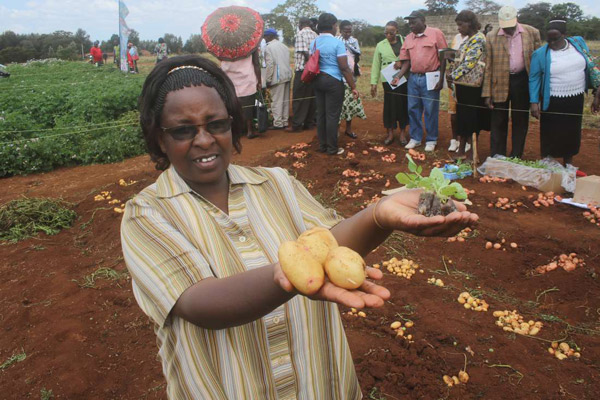 Mary Wanjiku displays potato seedlings and tubers propagated from rooted apical cutting technology during a potato training event at the Wambugu Agricultural Training Centre in Nyeri. Photo: Joseph Kanyi, nmg.
Mary Wanjiku displays potato seedlings and tubers propagated from rooted apical cutting technology during a potato training event at the Wambugu Agricultural Training Centre in Nyeri. Photo: Joseph Kanyi, nmg.
The Ministry of Agriculture in collaboration with Hygrotech, a private company is developing a new technology which will enable farmers get high quality potato seeds, doing away with reliance on tubers seeds.
According to the ministry’s press release on the current national food security situation October last year, production of potato declined by 17 per cent compared the long term average. The decline was attributed to inadequate certified seed among other reasons.
With the new technology known as True Potato Seed (TPS), it is expected that farmers will up their yields of potato which is widely grown by small-scale farmers and who face production constraints such as diseases like bacterial wilt.
The project is being undertaken at the Kenya Agricultural and Livestock Research Organisation (Kalro), Tigoni.
RELATED NEWS: Potato seed treatment technology boosts farmers’ income
RELATED NEWS: New technology helps farmer produce potato seeds in three weeks
RELATED NEWS: Potato seed multiplication earns farmer good cash
Nancy Ng’ang’a, a research officer at the Kalro centre, says the technology entails the use of two or three parental lines which are crossed to produce a progeny.
The final potato plant flowers and produces tomato-like fruits containing seeds which are later harvested, seeds extracted, dried, treated and packaged.
They are later sowed in a nursery to obtain seedlings, which are transplanted to the field. The seedlings take four to six weeks in the nursery while the plants take three months to mature, she explains.
If planted using the right directives, TPS can yield up to 50 tonnes per hectare and are resistance to diseases such as potato leaf roll virus.
The tuber dormancy is medium and it has a dry matter content of 21.9 per cent. It yields best in areas of 500-2,500 metres above sea level and produces white flowers.
One of the advantages of TPS, according to her, is that it requires 20-25g of seeds to plant per hectare compared to two tonnes of seed tubers
















Comments powered by CComment